Update: I have made several updates to my routine in the last 6 months and the content represents the most current version.
I have added a new article specifically focused on my mind routine that I only recently was able to settle into.
There is also a new article documenting my exact workout routine (with a disclaimer that I do change things from time to time).
I have shifted my wake up schedule back to 5:30am - however not ideal it is. Waking up at 6:00am, while better for sleep created way to much morning time compression.
I have pushed my Creatine supplementation to a full standard dose of 5g and it has made a noticeable difference. I am keeping an eye on DHT levels to make sure it stays in the middle of the range due to a however tenuous hair loss link from DHT elevation. (A note: please tell you doctor if you are supplementing with Creatine as your Creatinine marker on the Comprehensive Metabolic Panel will be elevated and a different test - such as Cystatin-C should be used to check for a kidney function).
There’s also a complete and up to date list of supplements I take.
I have started using iOS’s focus feature much more aggressively, ensuring no interruptions can occur whatsoever during meditations or workouts.
Latest DEXA scan results:
As promised - this will be about my daily routine, which I've refined over 10 years. I'll detail everything I do from the time I wake up to the time I go to sleep, along with the reasons and exceptions.
Why should you be interested?
People have repeatedly complimented me over the years for not aging, which I attribute to my routine. It is possible that I have won a genetic lottery (although according to 23andme, I don’t find anything that explains it). While my routine may not work for everyone, some principles I've adopted I believe to be generalizable, especially for those in high-stress fields like founders, CEOs, executives, and alike.
I am going to only share what I personally found helpful to me and experienced results with.
A bit about me:
I was born in Kyiv, Ukraine
Moved to the United States in 1995 and have since worked at early stages of Netscape, LinkedIn, Twitter and several other Silicon Valley companies
Presently I am a co-founder and CEO of Jelled, Inc
Below is my most recent DEXA scan data
Several important disclaimers:
This is not medical advice. Always consult with a licensed healthcare professional.
Science evolves quickly. While I strive to stay current, my time is limited, so there may be inaccuracies or outdated information.
When referring to products and services I use, it is simply what I use and nothing more. I have no ties or affiliations with any mentioned companies. They may not even be the best options currently available, but I use them either because they suffice for me or I haven't researched alternatives.
I am providing my reasoning and referencing resources to the best of my ability, but I have not thoroughly verified the accuracy of these sources.
My typical weekday schedule
When I say typical I mean it. My daily routine is as such unless there’s an emergency or travel - and even in those cases I do my best to stick to this pattern. Time cutoffs in the middle are approximate +/- 5-10mins.
5:30am: Wake up
Why 5:30am? Simple. As a CEO, I found that this is the only schedule that still works. However, this is by no means ideal. My preferred wake time has always been around 7:00am (interestingly, I learned from my 23andme results that my predicted wake up time is 7:16am).
I have been going back and forth between 5:30am and 6:00am - 6:00am is overall better for sleep, but in practice creates too much time compression in the morning.
Regarding sleep, there's an excellent book by Matthew Walker that I recommend. The TLDR is that if we didn't actually need sleep, evolution would have found a way to eliminate it long ago (after all, a tiger might visit your cave while you were asleep).
So, waking up even at 6:00 a.m. is still a bit problematic, but it's the compromise I've chosen to make (especially comparing to my earlier attempt to stick to 5:30am wake up schedule). I'm sure you'll agree that sleep is the hardest aspect to manage for a busy professional. It's the only buffer we have.
In summary, here's what I do:
I acknowledge that I currently get less than ideal amount of sleep (hopefully I'll find a solution in the future).
I make up for it a bit on weekends, although research shows it's not a full compensation.
When I feel excessively tired, I would take a 20-minute nap on days when I work from home (in actuality this has been quite rare).
I avoid stressful conversations or important decisions on days when I know I didn't get good quality sleep.
Do I track my sleep? Yes, I use an Oura ring. Although I find some of the data not as useful as I expected (the sleep staging algorithms, both the old and new one they've just released, seem to be quite a bit off subjectively and when compared to other devices). However, it can be helpful for trending and in specific instances, such as when you're about to get sick and you can see your metrics go off the charts.
How do I wake up? Most of the time, I wake up naturally without an alarm, which is likely due to keeping a consistent schedule. Even on weekends when I sleep in longer, my body still wakes up naturally. However, I have an alarm as an insurance, which is a Withings alarm lamp (now discontinued, but there are alternatives) with the sound turned off. It gently simulates sunrise. When I wake up and it's dark outside, I use as much artificial light in my home as possible.
5:30-6:00am: Personal Hygiene
A few words on oral hygiene: It is crucial, especially given recent research findings. Unfortunately, many of us, myself included, lack the patience to properly floss or to use the 2-minute timer on our electric toothbrushes. In my case, I tend to only brush for 30 seconds or so, and I rely on convenient flossers, which are not as effective as traditional floss.
There are several things that I do do:
I use a WaterPik (although I wish the company would improve its reliability - I need to replace mine every year, even when using RO water and following proper maintenance procedures).
I occasionally use a tool similar to this (the original one seems to be unavailable) to remove buildup on my front teeth.
I practice oral hygiene after every meal when possible, with options available for when I'm at work or traveling, such as single-use toothbrushes, flossers, and mouthwash packs.
Weight in
"Is it necessary to weigh yourself daily? I do it for a few reasons:
I like to understand the factors affecting my weight in detail and how they correlate with my workouts and calorie intake (for accuracy, it is important to take these measurements around the same time and under the same conditions)
Over time, I've developed a keen sense of how these variables interact.
It initially served as my accountability partner, which is why I continue to do it.
It's important to note that weight can fluctuate due to many factors, such as hydration and electrolyte levels. For example, a simple change in diet, such as switching to a low-carb regimen or consuming salt, can cause rapid weight changes in a matter of days or less. This is how athletes manage their weight class compliance before competitions.
Do I track other metrics, such as body fat percentage and muscle mass? Yes, but I've found bioimpedance scales to be unreliable, even for tracking trends. As an example - see the body fat percentage data taken from three different scales on the same day at the same time, along with a DEXA scan,. Until better technology is available, I don't place much importance on these metrics from scales.
Withings Body Cardio 15.1%
Omron HBF-514C 12.3%
Tanita RD-545 Interscan Pro - 9.6%
DEXA - 12.5%
The issue with Withings is evident as it lacks the ability to measure upper body (where I can clearly see a difference on DEXA scans). Their averaging algorithm doesn't seem to work for me. The old, trusted, non-bluetooth Omron scale (I wish they made a connected version) appears to be the most accurate of the three (although I've seen it be inaccurate as well), while the Tanita scale has been disappointing.
Blood pressure check
My blood pressure is within the normal range and I am not currently taking blood pressure medication. However, blood pressure is a crucial indicator of cardiovascular health, and I would like to track its changes over time.
6:00-6:30am: Meditation, journalling and urgent emails
Meditation
I start by reading a page from the Daily Stoic
The duration of my meditation is flexible, depending on my schedule and how much I feel I need at the moment.
Why do I meditate in the morning? I find mornings to be more efficient for a simple reason - after waking up, the brain is already close to an Alpha brainwave state, making it faster to get back into it during meditation. As a result, meditative practices are more effective and take less time.
I have divided my meditation practice into three distinct categories:
Meditation Practice: This involves practicing meditation techniques and feels like a workout. Don't expect it to be overly pleasant as it takes effort to gain a deeper understanding of non-duality of consciousness. I use an excellent Waking Up app by Sam Harris for this purpose.
Meditation: This involves introspection and intension setting and usually follows a 6-phase meditation pattern developed by Vishen Lakhiani, the founder of Mindvalley. The typical pattern includes: love and kindness, gratitude, goal visualization, day segment intending, forgiveness (if needed), and asking for a blessing.
Stress and Sleep Management: This type of meditation is used as needed and involves breath work, Yoga Nidra techniques, or a combination of different practices from the above categories.
I will do Waking-Up guided 10-mins meditation practice (#1) first thing in the morning. On some mornings, I will do #2 instead if I feel the need and the time permits.
When tackling a problem, I may revisit type #2 meditation during the day or evening, focusing on problem solving and goal visualization. However, for it to be effective, it takes at least 5-10 minutes to enter into Alpha / Theta brainwave state (I use a variation of a countdown technique, but there are other methods). This meditation needs to be intentional and free from time constraints.
A more comprehensive write-up of my routine is here.
Start my journal for the day
The journal is a very personal tool. I'm happy to share my format, but I strongly suggest you find one that works for you. You can borrow ideas, but remember, you are journaling for yourself, not anyone else. No one else will read it, only you. Unless you're Marcus Aurelius, of course. Mine is kept in Apple Notes.
Check email for urgent issues
This is of course the part that generates the most time flux.
6:30-7:45am: The workout segment
Exercise is one of the most important and complex topics. If it were a drug, it would be ranked number one. There's nothing more certain than the effectiveness of exercise for health, performance, and longevity. This is great news, but the bad news is that individualized exercise protocols can be difficult to execute and maintain, and they can be time-consuming. Therefore, we need to prioritize and think in terms of return on investment.
The timing of my workout is a personal decision. From a performance and injury prevention standpoint, late afternoon is the ideal time to exercise. However, for me personally, both practically (as it's a time I can do it reliably) and physiologically, the best time for me to work out is in the morning.
I have set up a dedicated workout space which allows me to be time-efficient during my exercise routine. I have found that many hotel rooms are sufficient as well, even when a hotel gym is not available. Driving to a gym and back would be an unacceptable time trade-off for me.
Let's examine the types of exercise to incorporate:
Power/Athletic Movements: This is extremely important as we age, as fast twitch muscle fibers tend to disappear, leading to increased risk of morbid injuries such as falls. Additionally, this type of exercise helps maintain the ability to perform physical tasks, such as lifting a suitcase into an overhead compartment ahead of the next guy.
Strength: This is crucial as it helps maintain the ability to move furniture and heavy objects.
Muscle endurance: This is simply an ability to get going in a physical activity of choice requiring particular muscle groups.
Muscle Mass: This is linked (although not perfectly) to strength, and we naturally lose it as we age. By maintaining muscle mass, we can regulate blood sugar levels and improve our overall appearance.
Zone 2 Cardio (Aerobic Training/Cardiovascular Endurance): This type of exercise helps maintain mitochondrial density, which is essential for cellular health. Declining VO2Max levels, which begin to decline by 2% per year after the age of 30, can indicate a decline in cardiovascular health. Get it down below 26 or so and welcome to the assisted living. Maintaining aerobic fitness through Zone 2 cardio can help slow this decline.
Flexibility and Balance: As we age, our flexibility and balance decreases, making us more prone to injuries. Incorporating exercises that improve these skills, especially at extended ranges of motion, is important for overall health and wellness (just observe how flexible children are and how well they move)
Zone 5 (Anaerobic Training/HIIT): This type of exercise is also important for overall fitness, especially for those looking to improve their athletic performance.
The good news - that for strength, muscle mass and muscle endurance focusing on high repetition movements to failure (i.e. pushups to failure, curls with medium weights to failure, an elliptical workout, etc) will address these goals for our purposes safely and efficiently.
As for the constraint, I'm willing to spend no more than 1 to 1:15 hours per day on my workouts, including warmup, cool-down, and soft tissue work. I aim to make my workout routine simple and easy to follow, which is why a custom-designed and monitored program is not practical for me. It would take too much time and effort to manage.
Therefore, I have decided to find a guided exercise program that meets most of my criteria and supplement it as needed. The program should:
Focus on compound movements
Incorporate power and muscle hypertrophy
Be an hour or shorter in length
Be balanced between muscle groups
Be technically straightforward, without the need for form supervision.
Why go with a guided program? There are both benefits and drawbacks. On the one hand, it's convenient as it has a defined pace and time frame, and the equipment needed is minimal. On the other hand, it may not always align with your specific preferences, and you may have to sometimes compromise quality in order to keep up with the pace. Additionally, you won't be able to multitask with listening to podcasts or audiobooks while working out.
A Few Words on Avoiding Injury, especially as we age.
I used to practice Krav Maga, and I still live with the aftermath of past injuries, which is why I substitute an elliptical workout for running sometimes due to a previous tendon injury.
When you have to stop working out because of an injury, you lose muscle at a rapid rate (as much as 2 pounds per week), and you can only gain it at a maximum rate of 2 pounds per month. These numbers are not exact and vary based on the circumstances, but the bottom line is that injury can have significant consequences. Additionally, your entire metabolic system can get disrupted. Connective tissues heal slowly, or not at all, as they don't receive enough blood flow, especially as we age and our vasculature becomes less efficient.
Therefore, it's crucial to avoid probable injury by avoiding extreme sports after a certain age. Exercise with good form and appropriate weight for your skill level, and avoid letting your ego get in the way. When I feel even a slight discomfort in my lower back or shoulders, for example, I immediately stop the exercise, reevaluate, and either lower the weight or discontinue that type of exercise altogether for that session. That said - “muscle burn” is a not a discomfort to be avoided. Hard work is required to illicit the requisite stimulus, so when I say failure or going all out in HIIT - I mean it, otherwise it is a waste of time.
I recommend using a mirror to check your form, recording yourself on more technical exercises, or having a qualified person watch you. A general physical therapy assessment every once in a while can also help identify problematic movement patterns and imbalances and perform prescribed corrective exercises to address any issues. I found the chapter on stretching in Paul Chek's book helpful as a self-help resource. Another resource that I’ve found useful and easy to apply specifically for correcting movement patterns is a system of exercises called Foundation Training.
A great aspect of DEXA is that it provides a muscle balance report, allowing you to take corrective actions for any imbalances identified.
During my workouts, I often alternate sides between sets to maintain equal balance between muscle groups, even if it's not always indicated in the program.
Workout tracking
I use an Apple Watch. I've found its heart rate tracking to be quite accurate, and it helps me estimate the calories I burn, which is synced with my food tracking app. However, the Apple Watch's estimate of my VO2Max tends to be 3-4 ml/kg/min lower compared to actual measurements.
Pre-workout drink
As my workout is going to be in a fasted state - I need a kick. I use a combination of Essential Amino Acids (EAA), a serving of a specific collagen powder and a half serving of Legion Pre-workout drink to provide me with a boost of energy. I have chosen these products because I find that the combination of ingredients works well for me and is acceptable to consume.
Regarding the EAA drink, I have tried many different brands (with cleaner ingredients and purportedly more optimized ratios) and found that this one is easy to mix and doesn't have an unpleasant taste, which was a problem with some other EAA drinks I tried.
Soft-tissue work (10-15mins)
Before my workout, I use one of the foam rollers and a set of massage balls for soft-tissue work. I've found that consistently doing this type of work minimizes, if not completely eliminates, age-related aches and discomfort, making you feel more like a teenager. I make a conscious effort not to skip it. Although it is not a substitute for a proper sports massage (which I still get once a month or so), I find that soft-tissue work provides one of the highest returns on my investment of time.
As far as massages go, I would say a good 90-minute full-body deep tissue massage is ideal (albeit rarely practical due to time commitments). Every two weeks is good, and once a month is the minimum.
Core workout
I periodically rotate my exercise programs to avoid boredom and try new things. My current workout structure is as follows:
On Sundays, Mondays, Wednesdays, Thursdays, and Fridays, I cycle through 6 Weeks of the Work routine that focuses on power, strength, and hypertrophy through a combination of compound movements using moderate weights.
On Tuesdays, I do an interval run or HIIT on an elliptical machine, followed by a pull-up routine I borrowed from T-30. On Saturdays, I go for a long endurance run or use the elliptical machine, followed by a chin-up routine with a monkey bar simulation, followed by a stretching routine.
Occasionally, I mix it up by adding a classic weightlifting session, an MMA routine, or an extra Zone 2 workout. On some evenings, time permitting, I may also do a short yoga or stretching routine.
During my workout, I focus on proper form, range of motion and intention, rather than maximizing weight. For instance, when I do a pull-up, I aim for a full-range, honest pull-up.
I do not take rest days, except when I am sick with a cold (which is a rare occurrence thankfully). I try to stick to this schedule even when traveling.
On days when I don't feel up for it (a serious lack of sleep, a massive schedule disruption, etc), I still work out but may lower the weight, slow down, or do fewer reps. When short on time, I do a bodyweight-only workout from the Insanity Max 30 series, which is my favorite for travel when a suitable hotel gym is not available. When all else fails, there is always 100 burpees.
Equipment
Below is my core equipment list:
Hex rubber-coated dumbbells: I prefer these over adjustable dumbbells as they do not roll on the floor, allowing for exercises such as pushup rows. Having multiple sets of dumbbells readily accessible (without the need to fiddle with the dials) is essential for many exercises.
Pull-up bar: I consider this to be a must-have piece of equipment as it is difficult to simulate some essential exercises without it.
Resistance bands of various types: These are useful for travel and to add additional resistance to exercises at different ranges of motion.
A foam roller
Exercise and yoga mats
Slide mat (so slides can work as my gym floor is rough)
In addition to my core equipment, I have accumulated some supplemental equipment over the years that I sometimes use, including:
A workout bench
Ez-bar (for curls and rows)
Hex bar (for deadlifts)
X3 variable resistance system
Several kettlebells
A couple of medicine balls (for pushups)
A stability ball
A slam ball.
7:45-8:45am: Shower, breakfast and getting ready
Shower
Make my breakfast share (pre-arrange ingredients on the weekend to make it quick and convenient)
A standup with my co-founder
A round of emails
Work
Lunch can be anywhere between 11:30 to as late as 2pm). I am perfectly fine to skip lunch altogether if I must - although this is not a preferred external as stoics would put it. The reason I can do this - is because - a) I do not snack and b) I am fairly fat adapted as my diet is on a lower carb spectrum.
I try to fit in a walk outside in the afternoon during the workday or before/after dinner. I don't see it as a workout, but as a chance to be outside, gather my thoughts, or hold walking meetings. Sometimes I listen to podcasts or audiobooks, but I find just walking and appreciating nature to be even better. It adds steps to your daily count and makes you feel good too.
Dinner
Dinner can be anywhere between 6:30pm and as late as 8:30pm. Unless it's a team dinner, this time is reserved for family and friends. I still try to do a good amount of work after dinner, as this is often the most productive time for me.
9:30-10:30: Getting ready for Sleep
The downside of my early wake-up is that I often feel the need to start winding down work between 9:30-10:30 PM (that includes daily reflections and closing my journal for the day), which is often when I am most productive. Failure to do so leads to shorter sleep and its consequences the next day, which unfortunately happens more often than I would like.
Regarding sleep environment, I follow the common guidelines for creating a quiet environment, reducing excessive light exposure in the evenings, using night shift on devices, and keeping the room temperature cool. Blue light blocking glasses had no effect for me, so I stopped using them. Checking emails while in bed is a big no-no and made a significant improvement in my sleep when I stopped doing it.
I have tried various mattress cooling systems, but they consistently worsened my sleep, except on exceptionally hot California summers when the air conditioning couldn't keep up. A weighted blanket had a mild positive impact, but the inconvenience wasn't worth it for me.
In terms of sleep architecture, as you can see, I am not a particularly deep sleeper. I have found that alcohol disrupts my sleep, so I have basically stopped consuming alcohol, even in moderation. I admit, I now drink de-alcoholized wine (available at Whole Foods). Late dinners have a similar effect, so I try to eat dinner early whenever possible.
I don't use any sleep supplements or medication, except for occasional melatonin after traveling to reset my circadian cycle.
To sum up, while I believe my sleep pattern is satisfactory, it is far from ideal. I am closely monitoring developments and advancements in the field of sleep research, as it has become increasingly evident that the quality and structure of one's sleep plays a critical role in enhancing both physical and especially mental performance.
Weekend schedule
Due to my inability to get sufficient sleep during the week, I often sleep in on weekends and wake up later, around 7-7:30am, instead of my usual 5:30am. This shift in my wake-up schedule usually leads to me skipping lunch, as breakfast becomes lunch. Despite this, I still try to maintain my bedtime routine from the weekdays. However, as we know from sleep science - this is not a full compensation for my lack of weeknight sleep.
Food and supplements
I view exercise as the most crucial component in enhancing performance and longevity. Peter Attia recently did an exceptional podcast on this subject. Food is important, of course, but it is also much more personal and influenced by many more factors, such as hereditary, environmental, and physiological factors. Studies surrounding food are much harder to conduct and the data is, quite frankly, not as reliable. A useful resource I can recommend is the excellent book "Burn" by Herman Ponzer.
I will simply list what I do. It is important to consult with a doctor for individualized advice (But, Professor, how do I find a good doctor? Next question...).
As previously mentioned, I generally follow a low-carb diet without a specific label. I try to steer clear of foods commonly found in the Standard American Diet (SAD), such as french fries, high-sugar foods, seed oils, sodas, and the like.
I feel much better burning fat than carbs (perhaps this is due to some disregulation as a result of my past dietary transgressions). I am able to quickly enter a state of ketosis when desired, as indicated by both a subjective feeling and the levels of ketones in my blood. This also allows me to skip meals without feeling hungry, which is useful for my unpredictable schedule. That said - an occasional high carb meal is not an issue. It is actually quite nice to have a good metabolic flexibility and to be able to vary energy sources.
It's important to monitor lipid levels, especially on a high-fat diet, as cardiovascular disease starts from birth. I currently use a statin to manage my APO-B levels. Peter Attia's blog has excellent resources on understanding the cardiovascular disease and approaches to prevention.
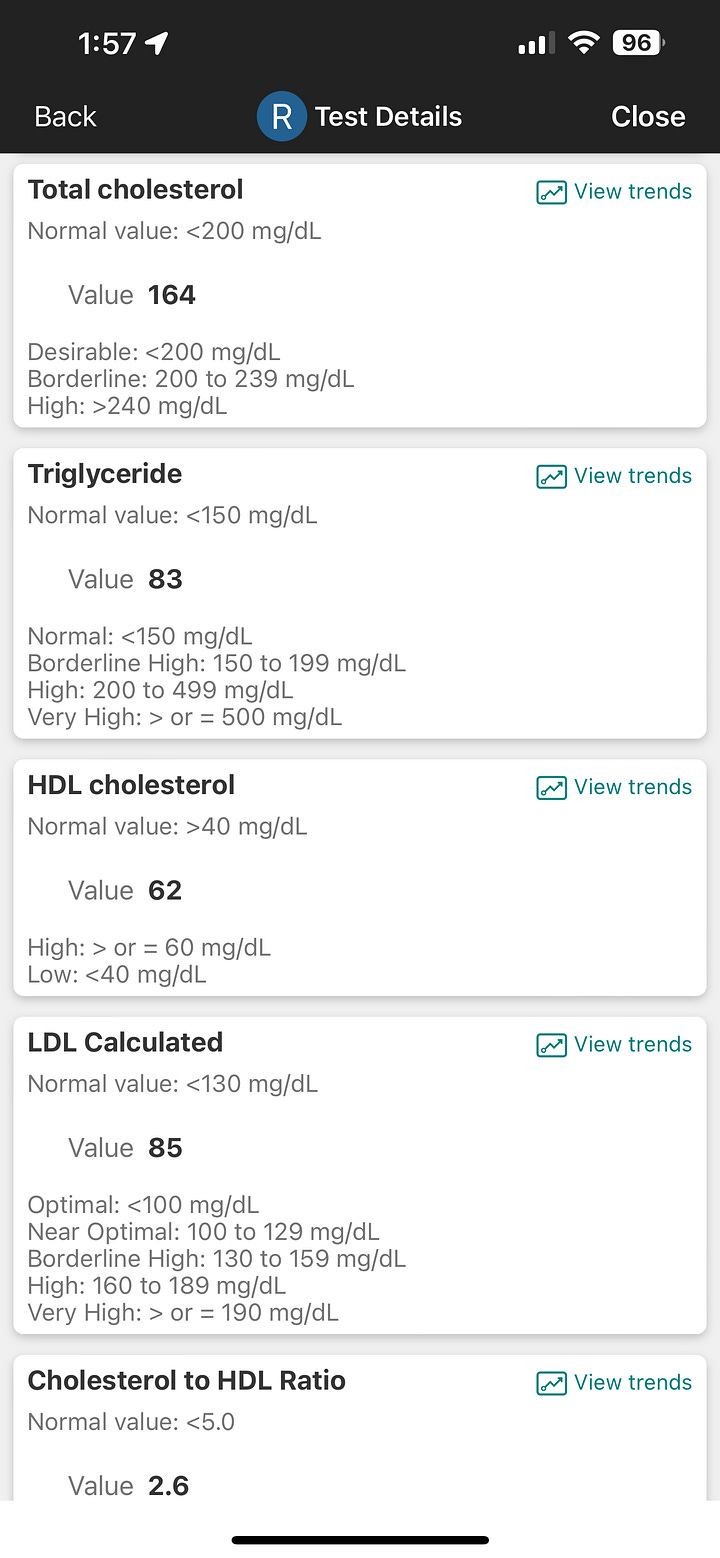
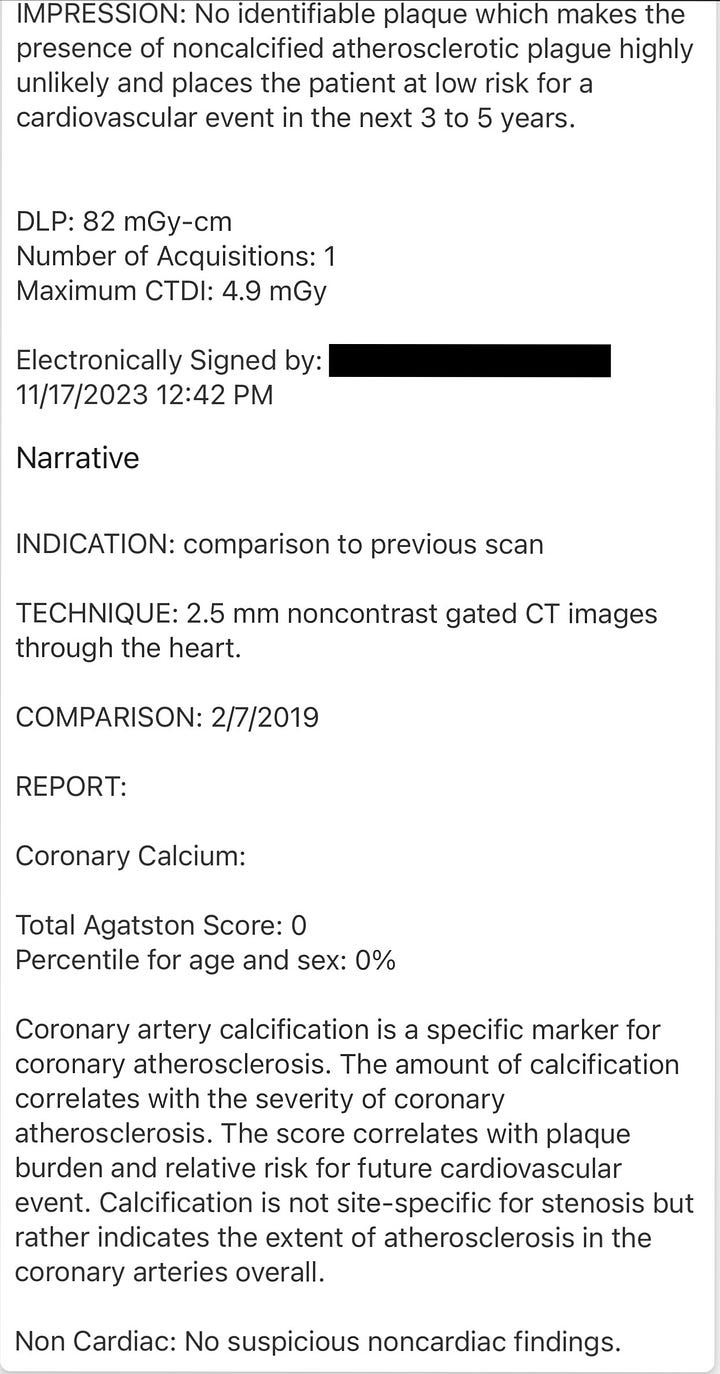
I am not against carbs. In fact, many people perform best with carbs, and higher carb intake is better for performance. I am simply optimizing for my own circumstances. Blood sugar spikes, rather than carbs themselves, can be a problem, so I recommend wearing a continuous glucose monitor (CGM) for 2-4 weeks periodically to see how you react to different foods. It may surprise you. For example, bananas, which are supposed to spike blood sugar, do nothing for me, but even a small amount of white rice causes my blood sugar to skyrocket. Some research suggests that food allergies may cause blood sugar spikes due to cortisol increases.
I do track my calories, using Cronometer after switching from MyFitnessPal. Although calorie tracking isn't precise, it teaches you that you consume more calories than you think and allows you to see trends over time by tracking your weight. Trend is more important than absolute precision.
As far as protein goes, I have an overall higher protein intake, on average about 0.8g per pound of weight.
For curious minds, I am not on any form of hormone replacement therapy (HRT). With that question out of the way, below are the supplements I use.
Core Supplements (AM):
A multivitamin. Among other things it has 2000IU of vitamin D that puts me in between 30-40 ng/ML range (you should test if you supplement to see that you are where you want it to be)
Vitamin K complex (a must if you significantly supplement with Vitamin D to prevent calcium accumulation within arteries)
Multi-form Magnesium (1/2 serving)
DHA/EPA (the standard dose matches my desired range on OmegaQuant test) - this is split into AM and PM servings
Creatine - 5g/day - this one of the most researched and useful supplements for physical and cognitive performance. The only negative is one study purporting a significant elevation of DHT (that I test for to make sure it stays in the middle of the range).
Aged Garlic extract (1/2 serving, to suppress levels of TMAO coming from Alpha-GPC from the Legion pre-workout drink and other choline sources such as in eggs and I know my TMAO levels were elevated on a blood test; that said - TMAO link to heart disease is far from bulletproof)
MacuGuard eye support
COQ10/PQQ for mitochondrial support (considering a statin)
Inositol - 1000mg
Adrenal Health Daily Support
Bacopa Monnieri
Tongkat Ali (cycle, 5d on, 2d off, 2 wks off every 10 weeks)
Cistanche (cycle, 5d on, 2d off, 2 wks off every 10 weeks)
Core supplements (PM)
Magnesium Threonate (1/3 serving)
NR + resveratrol + quercetin + tmg in this combination (1/2 serving)
Additional COQ10
Morning shake recipe:
Cold processed undenatured whey protein - 21g
Collagen protein - 9g
Olive oil (2 tsp)
Almond Milk Unsweetened - 12oz
Fresh lemon (squeezed)
Wild blueberry powder - 1 serving
Tart cherry powder - 1 serving
Pomegranate powder - 1 serving
Paleo Fiber - 1 serving
Some sort of fruit / berry - either a banana, frozen berries or an apple - depending on what’s around
Supplements listed above: for what’s appropriate in the morning and where possible I either use a powder form or break up the capsules and add them to the shake
When I (very rarely) need to sweeten something - I use an allulose based sweetener
Party Hacks
Imagine attending a business dinner or party that is overflowing with comfort food such as pasta and desserts. While enjoying this type of meal every once in a while is not a cause for concern, frequent occurrences, such as around holidays like Thanksgiving and Christmas, can be challenging.
Fortunately, there are a few pharmacological solutions that can help manage the effects. It's important to consult with a doctor before trying any of these. One option is Acarbose, which slows the absorption of complex carbohydrates and helps control blood sugar spikes. An additional option is Orlistat, which is available without a prescription and decreases the absorption of fats.
What to do when hopelessly behind schedule?
Let's say you had a late night, failed to wake up on time, or caught up in as an urgent email, call, meeting, or a family emergency. Despite these setbacks, I still strive to maintain my routine by adjusting some aspects of it.
For instance, I may skip the practice part of my meditation but still complete the phase part. I may also shorten my workout or opt for a shorter alternative. I may even have to skip a meal or adjust what I eat based on the type of workout I do. The goal is to still complete the routine, but in a shorter duration. I then adjust my meals accordingly to make up for the lack of activity. The next day, I make a conscious effort to get back on the proverbial horse.
That’s it for now. That is my equation. I hope you found this useful and thank you for reading.


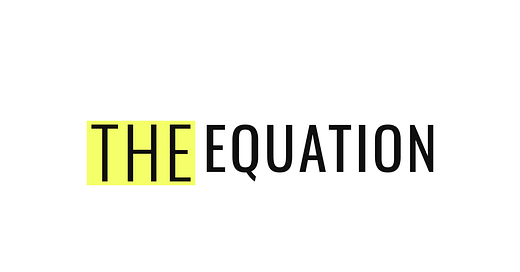



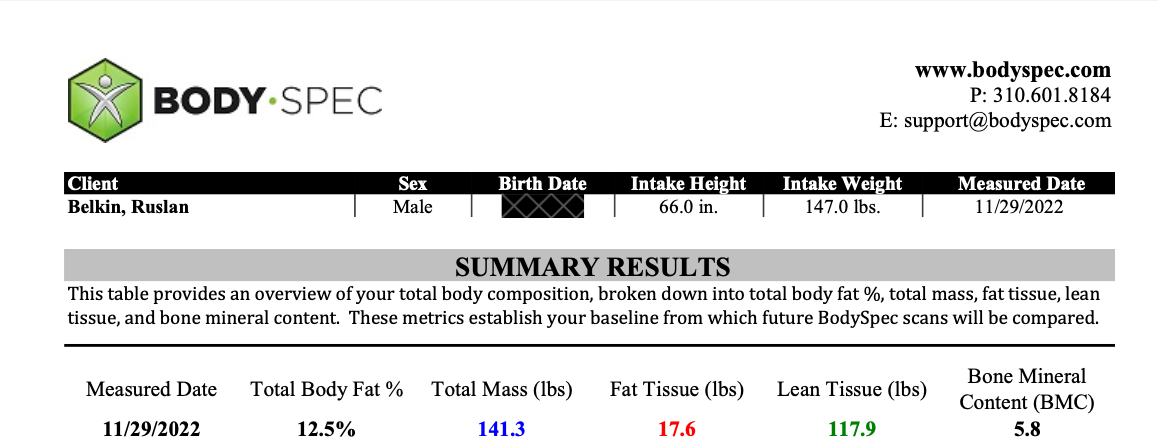
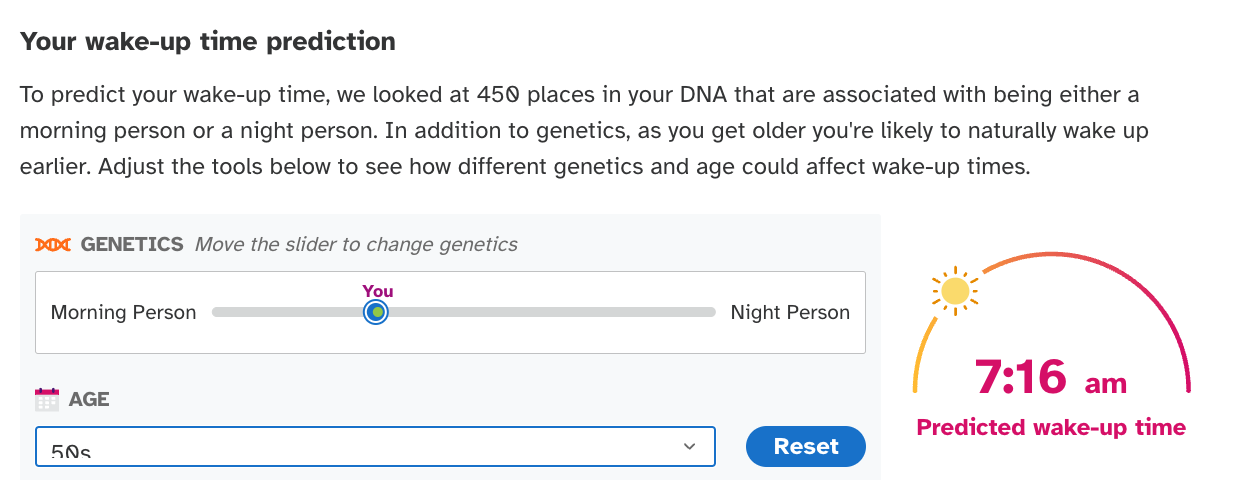

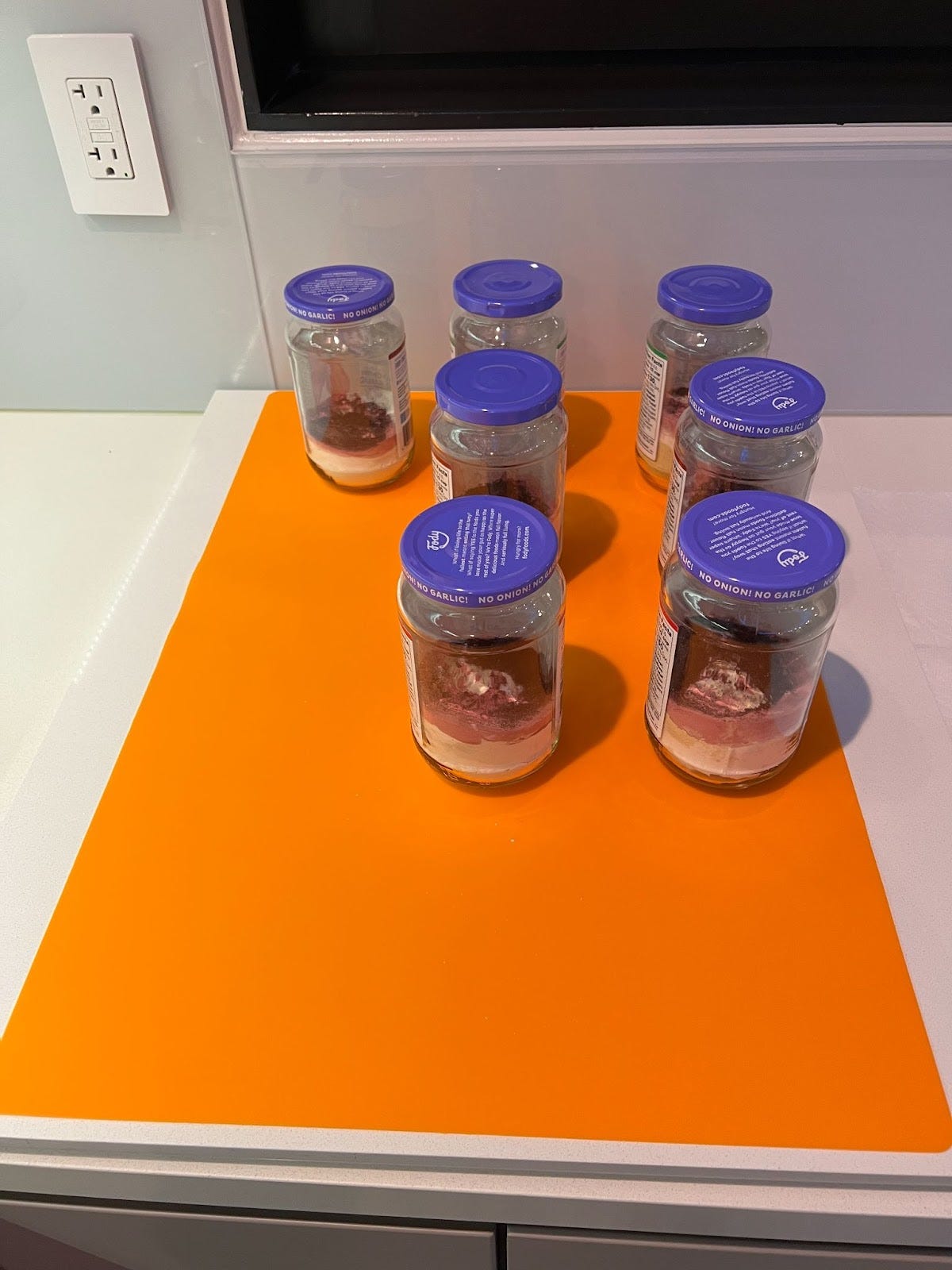
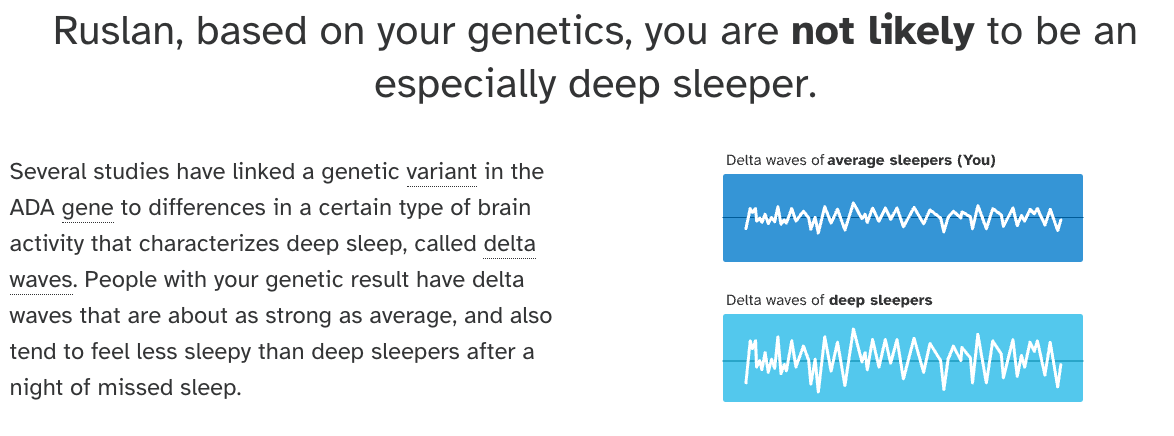
Made several updates to the original with few changes to the routine and additional info on "core" supplements.
Thank you for sharing! This routine looks amazing, and I'm super impressed you can do all of this stuff consistently!
You mentioned you've refined this routine over the last ten years, but did you have a well-established routine before that, just maybe not as intentional? Where do you start and how do you evolve your routine into something that's as sophisticated as yours?